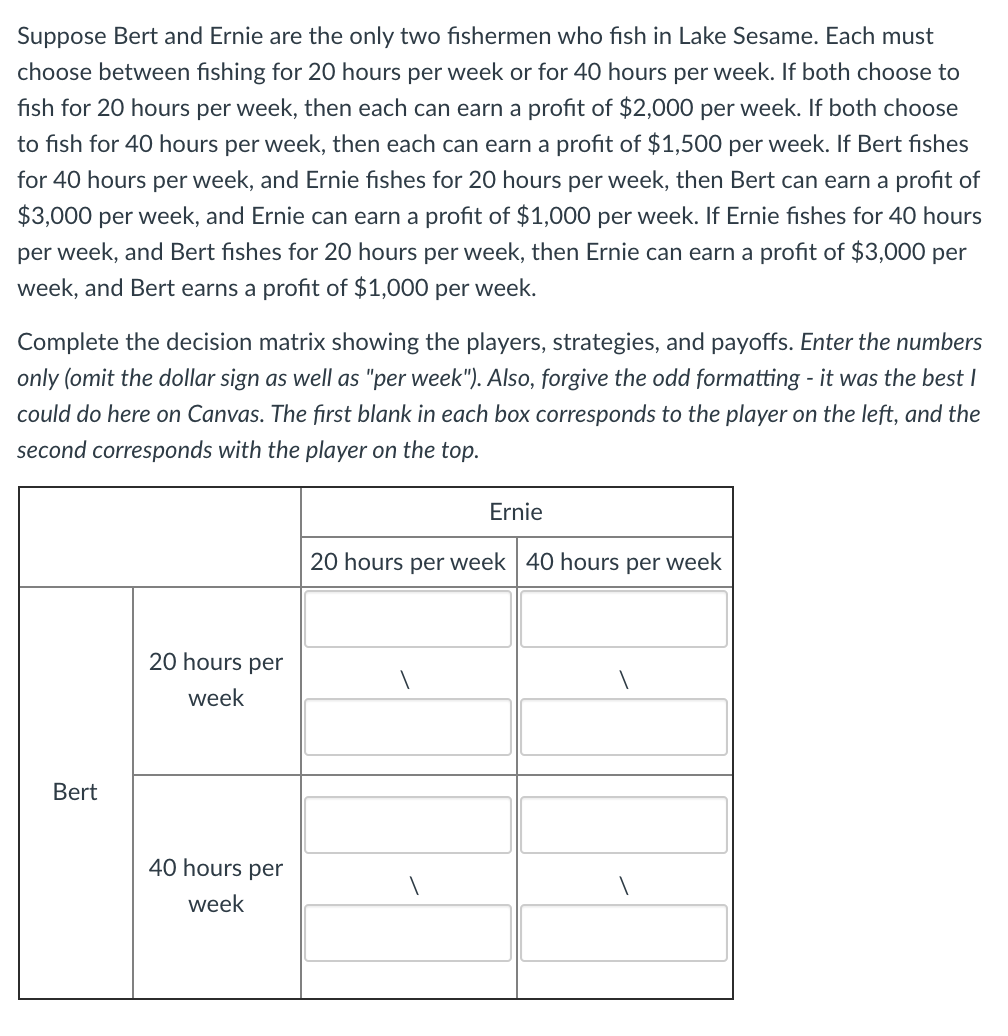Suppose Bert and Ernie are the only two fishermen who fish in Lake Sesame. Each must choose between fishing for 20 hours per week or for 40 hours per week. If both choose to fish for 20 hours per week, then each can earn a profit of $2,000 per week. If both choose to fish for 40 hours per week, then each can earn a profit of $1,500 per week. If Bert fishes for 40 hours per week, and Ernie fishes for 20 hours per week, then Bert can earn a profit of $3,000 per week, and Ernie can earn a profit of $1,000 per week. If Ernie fishes for 40 hours per week, and Bert fishes for 20 hours per week, then Ernie can earn a profit of $3,000 per week, and Bert earns a profit of $1,000 per week.
Suppose Bert and Ernie are the only two fishermen who fish in Lake Sesame. Each must choose between fishing for 20 hours per week or for 40 hours per week. If both choose to fish for 20 hours per week, then each can earn a profit of $2,000 per week. If both choose to fish for 40 hours per week, then each can earn a profit of $1,500 per week. If Bert fishes for 40 hours per week, and Ernie fishes for 20 hours per week, then Bert can earn a profit of $3,000 per week, and Ernie can earn a profit of $1,000 per week. If Ernie fishes for 40 hours per week, and Bert fishes for 20 hours per week, then Ernie can earn a profit of $3,000 per week, and Bert earns a profit of $1,000 per week.
Managerial Economics: A Problem Solving Approach
5th Edition
ISBN:9781337106665
Author:Luke M. Froeb, Brian T. McCann, Michael R. Ward, Mike Shor
Publisher:Luke M. Froeb, Brian T. McCann, Michael R. Ward, Mike Shor
Chapter16: Bargaining
Section: Chapter Questions
Problem 8MC
Related questions
Question
Fill in the chart attached and answer the following questions:
a) Bert's dominant strategy is to: (pick the correct answer below )
- no dominant strategy
- fish for 20 hours per week
-fish for 40 hours per week.
b) Ernie's dominant strategy is to: ( pick the correct answer below)
- no dominant strategy
- fish for 20 hours per week
-fish for 40 hours per week.
c) Is there a Nash Equilibrium? ( pick the correct answer below)
- No
- Yes, both fish for 20 hours per week
- Yes, one fisher for 40 and the other for 20.
- Yes both fish for 30 hours per week.
d) Is there an incentive for Bert and Ernie to collude? Why or why not?

Transcribed Image Text:Suppose Bert and Ernie are the only two fishermen who fish in Lake Sesame. Each must
choose between fishing for 20 hours per week or for 40 hours per week. If both choose to
fish for 20 hours per week, then each can earn a profit of $2,000 per week. If both choose
to fish for 40 hours per week, then each can earn a profit of $1,500 per week. If Bert fishes
for 40 hours per week, and Ernie fishes for 20 hours per week, then Bert can earn a profit of
$3,000 per week, and Ernie can earn a profit of $1,000 per week. If Ernie fishes for 40 hours
per week, and Bert fishes for 20 hours per week, then Ernie can earn a profit of $3,000 per
week, and Bert earns a profit of $1,000 per week.
Complete the decision matrix showing the players, strategies, and payoffs. Enter the numbers
only (omit the dollar sign as well as "per week"). Also, forgive the odd formatting - it was the best I
could do here on Canvas. The first blank in each box corresponds to the player on the left, and the
second corresponds with the player on the top.
Ernie
20 hours per week 40 hours per week
20 hours per
week
Bert
40 hours per
week
Expert Solution
This question has been solved!
Explore an expertly crafted, step-by-step solution for a thorough understanding of key concepts.
This is a popular solution!
Trending now
This is a popular solution!
Step by step
Solved in 4 steps

Knowledge Booster
Learn more about
Need a deep-dive on the concept behind this application? Look no further. Learn more about this topic, economics and related others by exploring similar questions and additional content below.Recommended textbooks for you

Managerial Economics: A Problem Solving Approach
Economics
ISBN:
9781337106665
Author:
Luke M. Froeb, Brian T. McCann, Michael R. Ward, Mike Shor
Publisher:
Cengage Learning

Managerial Economics: A Problem Solving Approach
Economics
ISBN:
9781337106665
Author:
Luke M. Froeb, Brian T. McCann, Michael R. Ward, Mike Shor
Publisher:
Cengage Learning